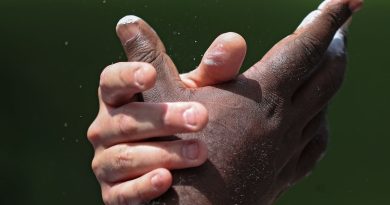TikTok sues the Trump administration for trying to ban it in the US
[ad_1]
TikTok has announced it is suing the Trump administration for trying to ban it in the US and insists it is not a national security threat despite being owned by Chinese company ByteDance because most of its senior executives are based in America.
In a press release on Monday morning before filing its lawsuit, the company said: ‘Now is the time for us to act. We do not take suing the government lightly, however we feel we have no choice but to take action to protect our rights, and the rights of our community and employees.’
On August 6, Trump signed an executive order which would ban people in the US from making transactions with the Chinese owners of the app – ie being able to download it – unless they were sold within 45 days. He later extended it to 90 days; the new deadline is November 12.
Microsoft is considering buying it but a deal has not yet been done.
In its press release, TikTok said it took ‘extraordinary measures’ to protect American users’ information from the Chinese government.

TikTok has more than 8billion users worldwide and 100million are in the US
‘The key personnel responsible for TikTok, including its CEO, Global Chief Security Officer, and General Counsel, are all Americans based in the United States—and therefore are not subject to Chinese law.
‘U.S. content moderation is likewise led by a U.S.-based team and operates independently from China, and, as noted above, the TikTok application stores U.S. user data on servers located in the United States and Singapore,’ the company said.
It goes on to say Trump’s order was ‘heavily politicized’ and that it has ‘no choice’ but to take legal action.
‘To be clear, we far prefer constructive dialogue over litigation. But with the Executive Order threatening to bring a ban on our US operations – eliminating the creation of 10,000 American jobs and irreparably harming the millions of Americans who turn to this app for entertainment, connection, and legitimate livelihoods that are vital especially during the pandemic – we simply have no choice .
‘The executive order is not rooted in bona fide national security concerns.
‘Independent national security and information security experts have criticized the political nature of this executive order, and expressed doubt as to whether its stated national security objective is genuine…
‘The President’s demands for payments have no relationship to any conceivable national security concern and serve only to underscore that Defendants failed to provide Plaintiffs with the due process required by law.’
The lawsuit comes amid growing whispers that Facebook CEO Mark Zuckerburg – a direct competitor of TikTok – told the president to ban it as far back as last year.
Facebook recently launched Reels in Instagram to compete with TikTok and it tried to lure some of TikTok’s biggest stars to their platform with cash offers.
The president has not yet responded to the claims, nor has he responded to TikTok’s lawsuit.
Did Zuckerberg tell Trump to ban TikTok? Facebook chief warned the president about social media app over dinner – and launched secret campaign to turn lawmakers against Chinese rival
Mark Zuckerberg spent September and October last year warning about the dangers posted by rival tech giant TikTok in what, according to a report on Sunday evening, was a deliberate attempt to turn Washington against the Beijing-owned company, almost a year before he launched his own version of it with Reels.
TikTok has gained more than 100 million U.S. users and is widely seen as the biggest threat to Facebook’s dominance of social media.
Instagram, which is part of Facebook, launched Reels on August 5. The company went after TikTok stars with huge followings and offered them large cash sums to switch over to their service.
In September Zuckerberg, Facebook’s CEO, held a series of meetings with political figures – among them Tom Cotton, the Republican Senator for Arkansas and a man known to have the ear of the president.
In October Cotton and Chuck Schumer, the most senior Democrat in the Senate, wrote a letter to intelligence officials demanding an inquiry into TikTok.
That inquiry led, this spring, to concern from Donald Trump – who has now told the Chinese owners of TikTok to accept an offer to buy the company, or else be banned from the U.S.

Mark Zuckerberg is pictured meeting Donald Trump at the White House in September 2019

Instagram launched Reels on August 5. It is a short-form video platform built within the app and has many of the same features as TikTok
Also in October, Zuckerberg spoke at Georgetown University, describing TikTok as being at odds with American values.
‘On TikTok, the Chinese app growing quickly around the world, mentions of protests are censored, even in the U.S.,’ he said in his speech.
‘Is that the internet we want?’
Days later, Zuckerberg reiterated his concerns about China during a White House dinner with Trump, the president’s son-in-law Jared Kushner, and Facebook board member Peter Thiel, who has been a backer of Trump, sources told The Wall Street Journal.
Facebook spokesman Andy Stone said Zuckerberg has no recollection of discussing TikTok at the dinner.
Zuckerberg’s team also reached out to members of Congress who are tough on China, the paper reported.
He asked them why TikTok should be allowed to operate in the U.S., when many American companies, including his own, cannot operate in China.
In November, Josh Hawley, a Republican Senator for Missouri who also had met with Zuckerberg in September, said in a hearing that TikTok threatens the privacy of American children.
‘For Facebook, the fear is lost social-media market share,’ he said.
‘For the rest of us, the fear is somewhat different.’
Facebook has established an advocacy group, called American Edge, that has begun running ads extolling U.S. tech companies for their contributions to American economic might, national security and cultural influence.
Facebook overall in the first half of this year spent more on lobbying than any other single company, according to data from the Center for Responsive Politics.
‘Our view on China has been clear: we must compete,’ said Stone, the Facebook spokesman.
‘As Chinese companies and influence have been growing so has the risk of a global internet based on their values, as opposed to ours.’
Kevin Mayer, the CEO of TikTok, in July publicly accused Facebook of trying to unfairly quash competition.
‘At TikTok, we welcome competition,’ he said in a blog post.
‘But let’s focus our energies on fair and open competition in service of our consumers, rather than maligning attacks by our competitor – namely Facebook – disguised as patriotism and designed to put an end to our very presence in the U.S.’
Last month, anonymous TikTok stars said they’d been offered hundreds of thousands of dollars to switch over to Reels before it launched.
According to the sources, Instagram was also offering to pay for the production of some users’ videos.
Facebook – Instagram’s parent company – issued them with non-disclosure agreements to stop them from discussing details of the deals publicly, it is claimed.
A Facebook spokesperson told The Journal about the grab for talent that the company had ‘approached a diverse range of creators about Reels in several of the countries where it’s currently being tested.’
None of the influencers who have been approached were named but one male user with millions of followers told The Wall Street Journal he would likely join Reels after being approached with an offer.
[ad_2]
Source link


